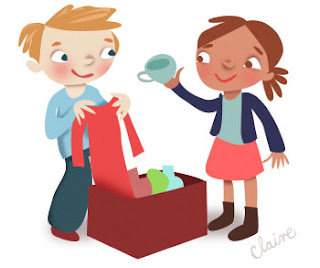Many classrooms, especially preschool and elementary settings, offer dramatic play stations and activities as a way to introduce young children to how the world around them works. From exploring careers to learning about families and responsibility, dramatic play classroom activities allow children to use their imaginations and enhance their developmental skills.
Dress Up
Using clothing, shoes, hats, jewelry and other accessories, put together a dress-up station or box where the students can learn how to button, zip, snap and put on outfits. Since kids love to play dress up in adult clothing, classroom dress up activities let them use their imaginations to create unique looks. During free play activities, students can select the items of their choice to wear, but for more structured play you may ask them to dress up as if they were going to work, to bed or to a fancy dinner.
Puppet Show
Finger puppets and hand puppets can help children learn the elements of a story, from setting and plot to character development. Puppet shows afford students an opportunity to create stories with their fellow classmates using unique characters they can create as they make up their stories. It'll inspire creativity and spark their imaginations.
Animals
Whether playing with stuffed or wooden animals or using items like paper plates to create animal masks, kids can learn about different types of animals, what they eat, where they live and the sounds they make. They can select their favorite animal and demonstrate how it would eat, sleep, sound and travel around in its habitat. Another possible activity is to allow the students to learn and act out how zoo keepers, farmers and pet owners care for their animals on a daily basis.
Pretend Kitchen
Preparing meals, washing dishes and setting the table are important skills children begin to learn at an early age through dramatic play in the classroom and at home. A pretend kitchen area is usually equipped with a stove, sink, refrigerator, child-friendly dish and pretend food. For a dramatic play classroom activity, assign children specific duties they need to fulfill in the kitchen area. You can even add tasks such as making a grocery list, shopping for food at the supermarket and putting the food items away in the kitchen.
Careers and Occupations
At a young age, children begin to pay attention to what the careers and occupations the adults in their lives hold. A classroom idea for dramatic play that explores careers and occupations is to have students tell the class what they want to be when they grow up and then dress the part using items from the dress-up area. Students can demonstrate what they think someone with the career of their interest does. Younger kids will likely select familiar careers like teachers, doctors, policemen, firefighters and nurses.


